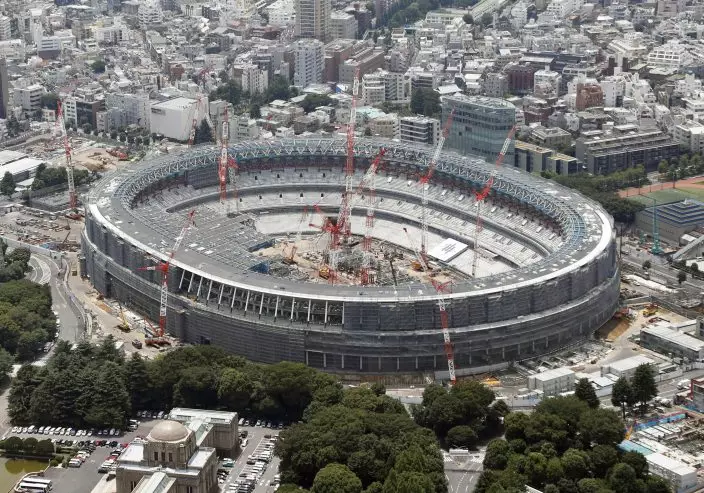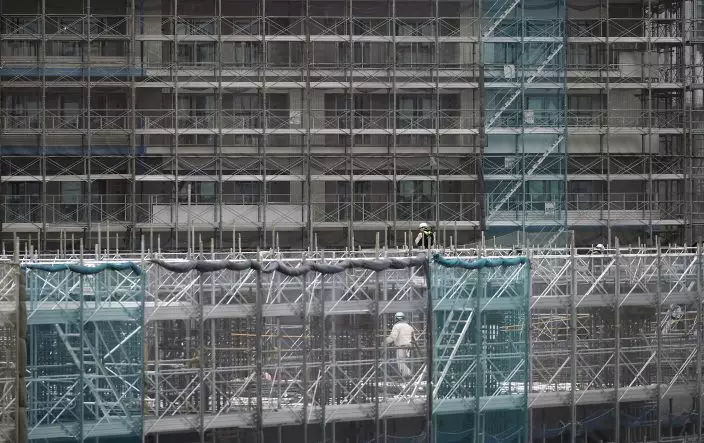An IOC inspection team took a routine tour of venues being built for the Tokyo Olympics on Tuesday, just days after an international labor union federation derided difficult working conditions at some Olympic sites.
Top International Olympic Committee officials meet in Tokyo this week with local organizers, where labor issues will be on an agenda that includes rising costs, worries about summer heat when the games open in just under 15 months, and complaints about cost cutting from international sports federations.
Issued last week, the labor report titled "The Dark Side of the Tokyo 2020 Summer Olympics," focused on labor issues at the new national stadium and the Olympic village — the two centerpiece venues for the Tokyo games.

FILE - This July 11, 2018, aerial file photo shows New National Stadium for the Tokyo 2020 Olympics under construction, in Tokyo. An IOC inspection team began a routine tour of venues being built for the Tokyo Olympics on Tuesday, May 21, 2019, just days after an international labor union federation derided difficult working conditions at some sites. (Kyodo News via AP, File)
Japan, with an aging and declining population, is short handed in many industries. The government has provided more visas for construction workers tied to the Olympics, and in April started allowing more foreign workers to reside in the country.
Ambet Yuson, general secretary of Building and Wood Workers' International based in Geneva, Switzerland, said the critical report had been sent to IOC president Thomas Bach.
"We were informed by the IOC that they are in direct contact with the Tokyo 2020 to find remedies," Yuson said in an email to the Associated Press.

In this Feb. 12, 2019, photo, cranes continue to work at the construction site of the Olympic Village for the 2020 Tokyo Olympics in Tokyo. An IOC inspection team began a routine tour of venues being built for the Tokyo Olympics on Tuesday, May 21, 2019, just days after an international labor union federation derided difficult working conditions at some sites. (AP PhotoEugene Hoshiko)
Yuson said he had not received a response from the Tokyo Metropolitan Government, which is building the Olympic village, nor the Japan Sport Council, a national government body that is building the stadium. The municipal government and the sports council told AP they were reviewing the report but offered few other details.
The report said that workers interviewed complained about "a pervasive culture of fear" that discouraged speaking out. It said almost half of the workers interviewed did not have formal contracts, and it found "dangerous patterns of overwork" at both high-profile venues. It said some workers at the Olympic village reported working 28 consecutive days, and up to 26 straight at the national stadium.
Yuson said some problems were made worse with tight Olympic deadlines and pressure to finish on time.
"The situation is even worse with so-called interns or migrant workers with issues — language, employment contracts and immigration issues," Yuson said by email. "Massive overtime in construction is really a big problem in Japan."
The report noted that two workers have died on projects for the Tokyo Olympics. The report said the labor federation began monitoring the Tokyo Olympics in 2016 and last interviewed workers in February.
Death by overwork, known as "karoshi," is a problem in Japan with employees often forced to work long hours despite government measures to try to prevent it.
Tokyo organizers also say they are trying to cut spending , which drew angry responses earlier this month at an annual meeting of Summer Olympic sports federations. One federation head said she feared a "cheap" look in Tokyo as organizers try to cut items they view as decorative that might be out of the view of television cameras.
Francesco Ricci Bitti, head of the Summer Olympic sports federations, is also an IOC member and part of the inspection team. He has promised to push organizers about the cuts.
Tokyo appears to be well-financed. The $5.6 billion, privately funded operating budget — the budget to run the games themselves — is twice as large as that for the 2016 Olympics in Rio de Janeiro. In addition, the national government, cities and prefectures are chipping in about $15 billion more to update infrastructure and get the country ready when the games open.
Tokyo officials have said operating costs have increased, partly by a decision to use more existing venues. Earlier plans called for constructing new venues, most of which would have been built at government expense.
The IOC has repeatedly said it is saving billions by using existing venues. But doing it has also shifted more costs to local organizers.
"Because Tokyo 2020 has been promoting the maximum use of existing facilities, naturally Tokyo 2020 is assuming the increased cost of the overlay and temporary facilities projects," Tokyo spokesman Masa Takaya said in a recent interview with AP.
He said the operating budget would not be increased and suggested some cuts were inevitable. Takaya said the cost to remodel existing venues and refit them was 95 billion yen (about $860 million).
Stephen Wade on Twitter: http://twitter.com/StephenWadeAP
More AP sports: https://apnews.com/apf-sports and https://twitter.com/AP_Sports


